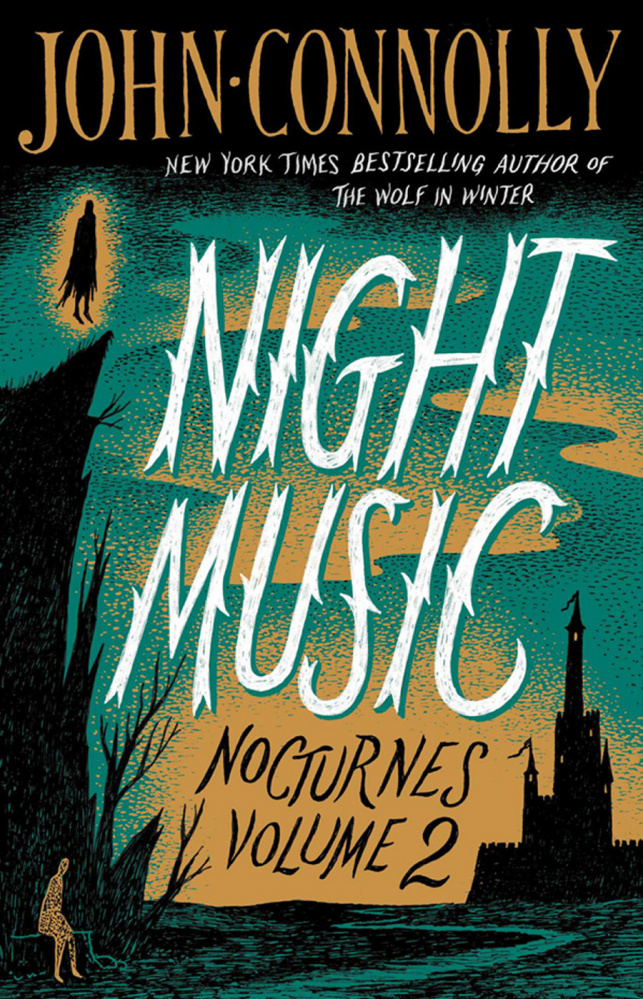As he has proved in his series of thrillers featuring Portland-based private investigator Charlie Parker, John Connolly knows how to unsettle, chill and outright terrify his readers. Since his 1999 debut, “Every Dead Thing,” the Irish author and occasional Maine resident has concocted intense novels that exhibit a strong vein of the supernatural beneath the more realistic depictions of Down East criminal investigation.
In 2004, Connolly published “Nocturne,” a collection of short stories and novellas that allowed him to give free rein to his interest in horror and the occult. Hot on the heels of his latest novel, “A Song of Shadows,” he now returns to the short form with “Night Music: Nocturnes Volume 2.”
The 13 selections collected in “Night Music” all contain elements of the supernatural, but while Connolly imbues the Parker books with a strong sense of Maine history and culture, the majority of these new stories are set in Britain and Ireland.
“The Blood of the Lamb” takes place in Dublin, focused on a married couple as they await the arrival of two Vatican priests who will examine their daughter. The girl has begun to exhibit miraculous healing powers, and her encounter with the visitors reveals itself to be a chilling exercise in misdirection.
“Lamia” follows a woman’s quest for vengeance against her rapist, and “The Hollow King” employs the structure of a fairy tale to explore a hellish bargain.
It’s difficult to do anything new with the classic ghost story, but Connolly displays a sure hand when he puts his mind to the task. “A Dream of Winter” spins a creepy spell in exactly 300 words, and “A Haunting” examines the end of a long, loving marriage through the prism of a spectral visitation.
Connolly moves farther afield geographically with “Lazarus,” in which the friends and family of the title character discover that corporeal resurrection has its drawbacks. And in “Razorshins,” a group of Maine bootleggers during Prohibition face off against a creature that demands tribute from any who cross its path.
Connolly clearly savors the power of fiction and the craft of storytelling, and that enthusiasm shines brightest in two related tales, “The Caxton Private Lending Library & Book Depository” and “Holmes on the Range.” The former, which opens this volume, follows old-before-his-time Mr. Berger, a retired housing registrar, after he witnesses what looks like a suicide by passenger train, a scene that strongly reminds him of the climatic moment from “Anna Karenina.” When no body is recovered, Mr. Berger becomes obsessed with learning the truth behind the vision, and his investigation leads him to the titular establishment, which harbors a host of literature-related secrets.
“Holmes on the Range” is a much-shorter follow-up, its title providing a big clue as to the story’s cast of characters. These two Caxton Library tales are charming exercises in metafiction that don’t allow their cleverness to overwhelm the drive of their narratives. They offer a gentle contrast to the more disturbing pieces in this collection, and many readers will be left wishing for further adventures in this milieu.
The centerpiece of “Night Music” is “The Fractured Atlas – Five Fragments,” another tale of the magical properties of literature. Across the centuries, unfortunate individuals in the book trade encounter a mysterious tome that seems intent upon rewriting the very essence of reality. The short novel is nastier and far more unsettling than most of the other offerings here, reminiscent of the darkest horrors of Clive Barker and H.P. Lovecraft.
Connolly concludes “Night Music” with an essay, titled “I Live Here.” The author recounts a time when he was confronted on tour by a female reader who wanted his advice on what to do about an abandoned dwelling that seemed, if not actually haunted, gone bad somehow. Connolly uses this encounter to explore the shelf of horror titles in his childhood bedroom and how they influenced his interest in stories of the supernatural.
Some readers object to the way Connolly mixes the uncanny into his crime fiction. But although he occasionally miscalculates, he generally gets the formula right. “Night Music” is a good opportunity to watch him take full rein of his supernatural enthusiasms, especially as the days shorten, temperatures dip and a creepy tale read in the dark is most welcome.
Berkeley writer Michael Berry is a Portsmouth, New Hampshire, native who has contributed to Salon, the San Francisco Chronicle, New Hampshire Magazine, the Los Angeles Review of Books and many other publications. He can be contacted at:
mikeberry@mindspring.com
Twitter: mlberry
Send questions/comments to the editors.



Success. Please wait for the page to reload. If the page does not reload within 5 seconds, please refresh the page.
Enter your email and password to access comments.
Hi, to comment on stories you must . This profile is in addition to your subscription and website login.
Already have a commenting profile? .
Invalid username/password.
Please check your email to confirm and complete your registration.
Only subscribers are eligible to post comments. Please subscribe or login first for digital access. Here’s why.
Use the form below to reset your password. When you've submitted your account email, we will send an email with a reset code.